- Home
- Hammond Innes
Air Bridge
Air Bridge Read online
Contents
Cover
About the Book
About the Author
Also by Hammond Innes
Dedication
Title Page
Note on the Text
Chapter I
Chapter II
Chapter III
Chapter IV
Chapter V
Chapter VI
Chapter VII
Chapter VIII
Chapter IX
Chapter X
The History of Vintage
Copyright
About the Book
The Soviets have cut off food and fuel supplies to West Berlin in a final attempt to force a stranglehold over the city. The Allied response is the Berlin airlift: thousands of flights carrying supplies – a lifeline to the people of Berlin.
A chance for heroism perhaps, but not for Neil Fraser or Bill Saeton. One is an ex-RAF pilot on the run from the law, the other will stop at nothing to build the perfect aircraft engine. In an abandoned hangar in the British countryside, tensions rise to boiling point.
About the Author
Ralph Hammond Innes was born in Horsham, Sussex, on 15 July 1913 and educated at Cranbrook School, Kent. He left school aged eighteen, and worked successively in publishing, teaching and journalism. In 1936, in need of money in order to marry, he wrote a supernatural thriller, The Doppelganger, which was published in 1937 as part of a two-year, four book deal. In 1939 Innes moved to a different publisher, and began to write compulsively, continuing to publish throughout his service in the Royal Artillery during the Second World War.
Innes travelled widely to research his novels and always wrote from personal experience – his 1940s novels The Blue Ice and The White South were informed by time spent working on a whaling ship in the Antarctic, while The Lonely Skier came out of a post-war skiing course in the Dolomites. He was a keen and accomplished sailor, which passion inspired his 1956 bestseller The Wreck of the Mary Deare. The equally successful 1959 film adaptation of this novel enabled Innes to buy a large yacht, the Mary Deare, in which he sailed around the world for the next fifteen years, accompanied by his wife and fellow author Dorothy Lang.
Innes wrote over thirty novels, as well as several works of non-fiction and travel journalism. His thrilling stories of spies, counterfeiters, black markets and shipwreck earned him both literary acclaim and an international following, and in 1978 he was awarded a CBE. Hammond Innes died at his home in Suffolk on 10th June 1998.
Also by Hammond Innes
Attack Alarm
Atlantic Fury
Campbell’s Kingdom
Dead and Alive
Delta Connection
Golden Soak
High Stand
Isvik
Killer Mine
Levkas Man
Maddon’s Rock
Medusa
North Star
Solomons Seal
Target Antarctica
The Angry Mountain
The Big Footprints
The Black Tide
The Blue Ice
The Doomed Oasis
The Land God Gave to Cain
The Last Voyage
The Lonely Skier
The Strange Land
The Strode Venturer
The Trojan Horse
The White South
The Wreck of the Mary Deare
Wreckers Must Breathe
For Daphne and Bill
HAMMOND INNES
Air Bridge
Note on the Text
IN THE SECTIONS of this book dealing with the Berlin Airlift I am indebted to the Royal Air Force, who flew me into blockaded Berlin and who gave me every facility for studying the lift, both on the ground and in the air. I should like to take this opportunity of expressing my appreciation of the Air Ministry’s willingness to assist me and of the friendly co-operation I received from lift personnel at Wunstorf and Gatow at a time when they were very overworked.
It is inevitable, in a story of this nature, that the types of aircraft and the titles of air-force personnel should be those that operated at the time and at the bases concerned. I wish to make it clear, therefore, that the story is not founded on anything that actually occurred and, in particular, that the characters in the story who hold official positions are entirely fictional.
I
IT WAS DARK and I was very tired. My head ached and my mind was confused. The road ran uphill between steep banks and there were trees with gaunt branches spread against the pale glimmer of the Milky Way. At last I reached the level and the high banks gave place to hedges. Through a gap I caught a glimpse of an orange moon lying on its back on the far side of a ploughed field. Nothing stirred. All life seemed frost-bound in the cold of night. I stood for a moment, exhausted, my knees trembling weakly and the sweat drying like cold steel against my skin. A little wind ran chill fingers through the bare spikes of the quick-thorn and I went on then, driven by the shivers that ran through my body. It was the reaction after the crash. I had to find somewhere to lie up—a barn, anything, so long as it was warm. And then I had to get out of the country. I was meeting the wind now and, even as I walked, it chilled the sweat on my body. My steps no longer rang firm. The sound of them became a shuffle that was lost every now and then in the lashing of the trees in a small copse.
The country round was quite flat now—a familiar flatness. The sharp edges of a large rectangular building stood for a moment black against the moon. It was there for an instant, gaunt and recognisable, and then it was lost behind the high earth mounds of a dispersal point. I stopped, my body suddenly rigid. The dispersal point and that distant glimpse of a hangar confirmed what I had already sensed almost automatically. The flatness that stretched before me was an aerodrome.
If I could get a plane! Damn it—I’d done it before. And it had been far more difficult then. I could remember the fir trees and the feel of the sand, almost silver in the moonlight, and the dark shadows of men against the hangar lights. The picture was so vivid in my mind that the same surge of excitement took hold of me now, tensing my nerves, giving me strength. I turned quickly and slid into the woods.
It was less cold in the woods or else the sudden urgency of hope gave me warmth as well as energy. It was darker, too. I might have lost my sense of direction, but always there was Jupiter, like a candle flickering amongst the branches, to show me the way the road had run. The trees clutched at me, whipping across my face, and in a moment I felt the warm trickle of blood from the cut on my forehead. The thick, salt warmth of it reached my tongue as I licked at the corner of my mouth. But it didn’t hurt. In fact, I barely noticed it. I was intent upon one thing, and one thing only—a plane.
I came out of the wood on the very edge of the perimeter track, a fifty yard wide ribbon of tarmac, rutted and hillocked by the frosts and marked with the dead stalks of summer’s weeds. Left and right it seemed to stretch to the horizon, and across the track was the airfield, a bleak, open hilltop, black under the moon, for the grass was gone and it was all plough. The curve of that hilltop was smooth and even like the curvature of the earth’s surface, a section of a globe hung against the stars. The only relief to that impression of void was away to the left where the black edge of a hangar seemed to be shouldering the moon up the sky.
I stood there for a moment, conscious again of the wind cutting through my clothing as the sense of emptiness drained the excitement out of me. The story of the ploughed-up grassland, the dead weed stalks and the frost-broken tarmac was evident in the dead atmosphere of the place. The airfield was deserted. It was one of the great bomber stations that had died with the end of the war. It was easy to see it as it had been, full of activity with the roar of planes coming in from a raid—big
, graceful shapes, in silhouette against the flarepath, settling clumsily on to the runway. This sort of place had been my life for six and a half years. Now the planes only existed as ghosts in my mind. All about me was empty desolation, a slow disintegration moving inevitably back to the land from which it had sprung up.
With a feeling of hopelessness I started along the perimeter track towards the hangars. They would be just derelict shells, but at least they would give me shelter for the night. I felt suddenly sick and very tired—a little scared, too. The desolation of that airfield ate into me, bringing with it an awareness of my own loneliness.
The perimeter track seemed unending, growing wider and more desolate at every stumbling step as the wind thrust into my stomach till it chilled and stiffened my spine. Dizziness overtook me. It was the crash, of course, and the awful crack I’d got on the head. And then a flicker of hope came to steady me. The hangars now loomed black against the moon, big rectangular skeletons slowly crumbling away. But at the far end of the concrete apron there was one that looked whole and solid. The line of windows along its side was intact and reflected a glimmer of starlight.
I quickened my pace. It was just possible that some private owner, a local farmer or landowner, kept his plane up here on this deserted aerodrome. That was the hope that sent me hurrying across the apron to the deep shadows of the hangars. And as I slid from one hangar to the next I prayed to God that there would be petrol in the tanks.
I was a fool perhaps to build my hopes on such slender foundations as the fact that one hangar was intact. But when you’re desperate you clutch at anything. Before I’d even reached the hangar I was already mentally in the cockpit of some tiny aircraft winging my way through the night towards France. I knew exactly how the coast would look as it slid beneath me and how the Channel would be gently corrugated at right angles to my line of flight as the waves reflected the slanting rays of the moon. I could see myself checking in at the little hotel in Montmartre where I’d stayed several times before and then after a rest, going to Badouin’s office. Badouin would fix it all for me. Everything would be all right as soon as I’d seen Badouin.
I reached the hangar and stood for a moment in the shadow of its bulk. I was panting. But I no longer felt sick or dizzy. I was trembling slightly, but that was just nerves. I had plenty of energy. Nothing could stop me now. I slid round the corner of the building and along the face of the huge sliding doors.
My luck was in, for the little wicket door in the centre yielded to the touch of my hand, revealing a dark void full of vague shadows. I stepped inside and closed the door. It was still and very cold with that queer musty smell of damp on concrete. Some glimmer of moonlight seemed to penetrate into the rear of the hangar, for the shadows resolved themselves into the nose and wings of a large four-engined plane. It was facing me head-on and it seemed enormous in the gloom of the hangar.
The incredible luck of it! I ducked under the port wing and moved along the fuselage, running my hand along the cold metal of it, searching for the door.
“So. His work is not to be remembered.”
I stopped with a jerk. It was a girl’s voice that had spoken.
A man answered her: “I’m sorry. War is a dirty business.”
“But the war is finished.”
“Yes, but you lost it, remember.”
“And because Germany loses a war, my father must suffer? My father has suffered enough, I think.”
“Your father is dead.” The brutal words were said in a hard, matter-of-fact voice.
A silence followed. Peering over the tailplane I could see the outline of two figures against the steady glow of a pressure lamp. The man was short, thick-set and powerful-looking and as he moved towards the girl he unmasked the lamp so that its dim light showed me the litter of a work-bench running the width of the hangar and the dark shadow of a belt-driven machine lathe.
I turned quickly. The lamplight was glowing on the metal of the plane and as I slid along the fuselage towards the door I saw that it was a Tudor and its inboard engine was missing.
If I had gained the door unnoticed I should not now be setting down what must surely be the most extraordinary story of the Berlin Airlift. But my foot caught against some scrap metal and with the sudden clang of sheet tin I froze.
“Who’s that?” It was the man’s voice and it had the drive of a man accustomed to absolute authority. “So you’ve got friends here, have you?” The beam of a torch swept the plane and then spotlighted me with its dazzling light. “Who are you? What do you want?”
I just stood there, blinking in the glare, incapable of movement, panic lifting my heart into my mouth.
The torch moved suddenly. There was a click by the wall and the sound of an engine starting up outside. Then lights, glowed and brightened.
The man was facing me across the tail of the plane now and he had a gun in his hand. He wasn’t tall, but he was immensely broad across the shoulders. He was thick through like a bull and he held his head slightly forward as though about to charge. I hardly noticed the girl.
“Well, who are you?” the man repeated and began to move in on me. He came slowly and inevitably like a man sure of his ability to handle a situation.
I broke and ran. I wasn’t going to be caught like this, trapped in a hangar, accused of attempting to steal an aircraft as well as a car. If once I could get to the shelter of the woods I’d still have a chance. I ducked under the wings with the sound of his feet pounding on the concrete behind me. As I wrenched open the door of the hangar he shouted at me in German: “Halt! Halt, Du verrückter!” That damned language with its memory of endless, unbearable days of prison and the nagging fear of the escape gave me a last burst of energy.
I shot through the door and in a moment I was out on the perimeter track racing for the dark line of the woods. I crossed the concrete of the runway-end, my breath a wild hammering in my throat. My mind had become confused so that I seemed to be running again from the tunnel mouth to the dark anonymity of the fir woods. At any moment I expected to hear the deep bay of the dogs and my skin crawled between my shoulder blades just as it had done that night in Germany so long ago, cringing in anticipation of the shattering impact of a bullet. The concrete was broken and matted with weeds. Then I was on plough with the clay clinging to my shoes and the sound of my flight deadened in the sticky earth.
I stumbled and clawed my way to the woods. I heard my pursuer crash into the undergrowth close behind me. Branches whipped across my face. I barely noticed them. I found a path and then lost it again in a tangle of briar that tore at my clothes. I fought my way through it to find that he’d skirted the brambles and was level with me. I started to double back, but the undergrowth was too thick. I turned and faced him then.
I didn’t stop to think. I went straight for him. God knows what I intended to do. I think I meant to kill him. He had shouted at me in German and my mind had slipped back to that earlier time when I had been nearly hunted down. His fist struck my arm with numbing force and I closed with him, my fingers searching for his windpipe. I felt the knobbly point of his Adam’s apple against the ball of my thumb, heard him choke as I squeezed. Then his knee came up and I screamed in agony. My hands lost their grip and as I doubled up I saw him draw his fist back. I knew what was coming and was powerless to stop it. His fist seemed huge in a shaft of moonlight and then it shattered into a thousand fragments as it broke against my jaw.
What followed is very confused in my mind. I have a vague memory of being half-led, half-carried over ground that seemed to rise and fall in waves. Then I was lying on a camp bed in an office full of bright lights. I was being interrogated, first in German, then in English. There was only one person there—the man who had hit me. I didn’t see any sign of the girl. He sat in a chair, leaning over me so that his big, solid head seemed hung in space, always on the verge of falling on me and crushing me. I tried to move, but my hands and feet were bound. The light was above me and to the left. It was ver
y bright and hurt my eyes. My jaw ached and my head throbbed and the interrogation went on and on through periods of black-out. I remember coming round once with a cry of pain as the searing burn of disinfectant entered the wound on my forehead. After that I slept.
When I woke it was daylight. I lay staring at the ceiling and wondering why it was plain, untreated concrete. The walls were bare brick. In the opposite corner the mortar had crumbled away and there was a long, jagged crack stuffed with newspaper. Slowly the events of the night before came back to me—the airfield, the hangar, the struggle in the woods.
I sat up with a jerk that sent a stab of pain shooting through my head. My jaw was painful and slightly swollen, the cut on my forehead was covered with lint secured by adhesive tape. There was a patch of dried blood on the grey Army blanket that had been pulled over me. I swung my legs out of bed and then sat there for quite a while staring at the unfamiliar room and fingering my jaw.
It was quite a small room and had obviously been used as an office. There was a cheap desk with a portable typewriter in its case, an old swivel chair, a steel filing cabinet and an untidy litter of books and papers. The books, I saw at a glance, were all technical manuals—engineering, mechanics, aviation. They were thick with dust. The floor was of bare boards and a rusty stove stood against one wall, the chimney running out through a roughly-patched hole in the ceiling. The windows were barred and looked out on to a pile of rubble and a vista of broken brick foundations, half-covered with dead sorrel stalks. There was an air of disintegration about the place. My gaze focused and held on the bars of the windows. They were solid iron bars set in cement. I turned quickly to the door with a feeling of being trapped. It was locked. I tried to find my shoes, but they had been removed. Panic seized hold of me then and I stood quite still in the middle of the room in my stockinged feet and fought it down.
I got control of myself at last, but I was overcome with a feeling of sickness and lay down on the bed. After a time the sickness passed and my brain became active again. I was in a hell of a spot! Oh, I was being quite honest with myself then. I knew I’d tried to kill a man. I could remember the feel of his windpipe against my thumb. The question was, did he know that I’d meant to kill him?

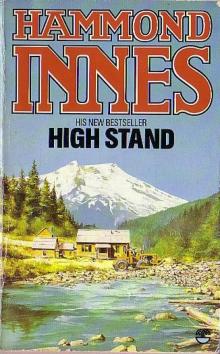 High Stand
High Stand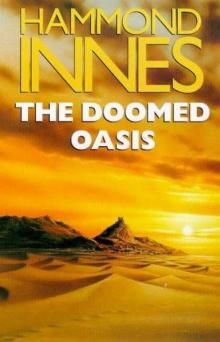 The Doomed Oasis
The Doomed Oasis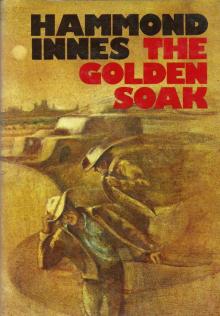 Golden Soak
Golden Soak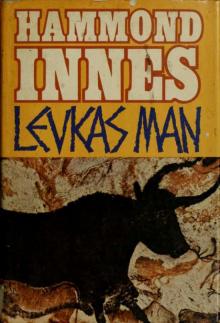 Levkas Man (Mystery)
Levkas Man (Mystery)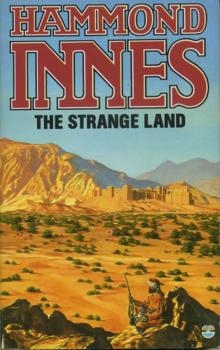 The Strange Land
The Strange Land Dead and Alive
Dead and Alive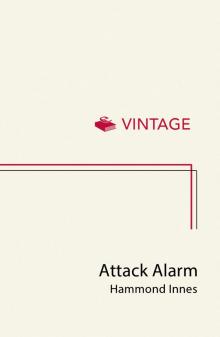 Attack Alarm
Attack Alarm The Strode Venturer
The Strode Venturer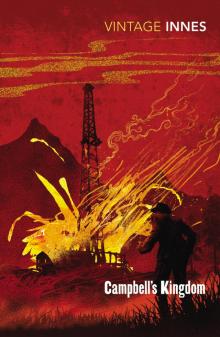 Campbell's Kingdom
Campbell's Kingdom North Star
North Star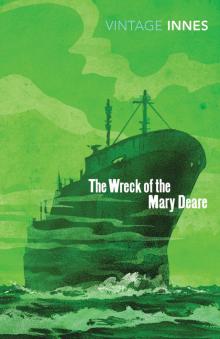 The Wreck of the Mary Deare
The Wreck of the Mary Deare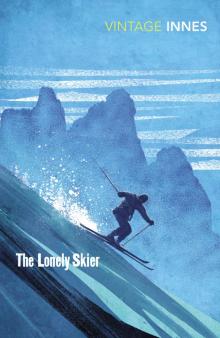 The Lonely Skier
The Lonely Skier The Black Tide
The Black Tide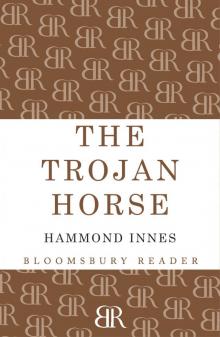 The Trojan Horse
The Trojan Horse Medusa
Medusa Air Bridge
Air Bridge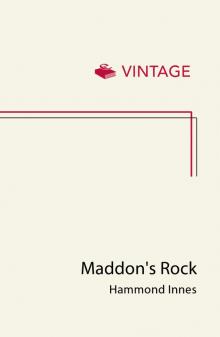 Maddon's Rock
Maddon's Rock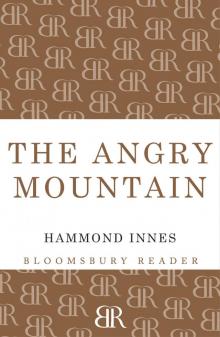 The Angry Mountain
The Angry Mountain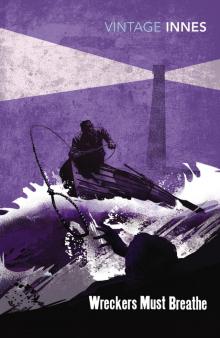 Wreckers Must Breathe
Wreckers Must Breathe Solomons Seal
Solomons Seal The White South
The White South